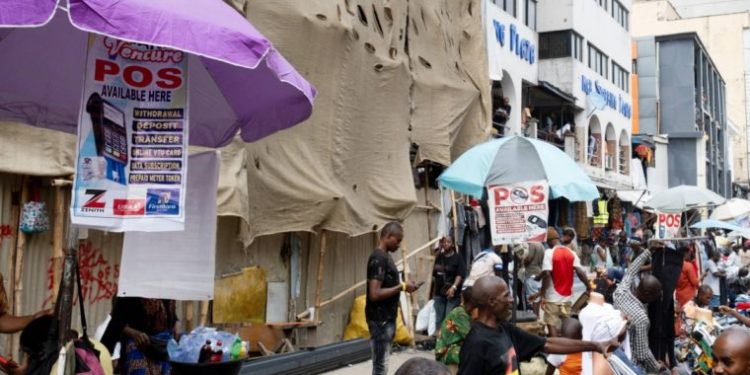The Central Bank of Nigeria (CBN) has introduced new rules for agent banking, setting a maximum daily cumulative transaction limit of ₦1.2 million for Point-of-Sale (POS) agents nationwide.
The new operational framework, released on Monday, also requires all financial institutions to submit monthly reports on the activities of their POS agents to strengthen oversight and improve service delivery.
The directive, referenced PSP/DIR/CON/CWO/001/049, was signed by Musa Jimoh, Director of the Payments System Management Department. According to the apex bank, the move aims to enhance financial stability, protect consumers, and promote wider financial inclusion.
The circular takes immediate effect, while sections concerning agent location and exclusivity will come into force on April 1, 2026.
Background
POS agents have become vital to Nigeria’s financial system, providing easy access to banking services in both urban and rural areas. The model began in 2013, when the CBN, under then-Governor Sanusi Lamido Sanusi, introduced the agent banking system to promote a cashless economy and reach underserved communities.
Since then, POS usage has grown rapidly. The International Monetary Fund (IMF) estimates that there are about 1,600 POS operators per square kilometre in Nigeria.
By March 2025, there were 8.36 million registered POS terminals, with 5.90 million active, representing a 119% increase from March 2024. During the same period, POS transactions totalled ₦10.51 trillion, a 301% rise from ₦2.62 trillion in the first quarter of 2024, according to data from the Nigeria Inter-Bank Settlement System (NIBSS).
A previous CBN policy in 2022, aimed at controlling inflation, restricted daily withdrawals via ATMs and POS. That measure reduced the total currency in circulation from ₦3.01 trillion in December 2022 to ₦982.1 billion in February 2023.
Key Provisions of the New Guidelines
1. Eligibility and Restrictions
Only individuals and businesses that meet strict conditions can operate as POS agents.
- Underage persons (below 18) are not eligible.
- Those with unpaid or non-performing loans, blacklisted BVNs, or criminal convictions are disqualified.
- Businesses must provide proof of registration, tax compliance, and sufficient capital before approval.
2. Credit Verification
All applicants will undergo background checks through licensed credit bureaus to confirm their credit status. This aims to block individuals with bad debts or fraudulent histories from entering the sector.
3. Exclusive Partnerships
Each POS agent can now work with only one financial institution—either a bank or a fintech. Dual affiliations or multiple partnerships are no longer allowed.
4. Dedicated Accounts
All agent transactions must pass through a dedicated account or wallet assigned by their principal bank. Activities outside this account are considered unauthorized and may result in blacklisting or termination.
5. Transaction Limits
- ₦100,000 cash-out limit per customer daily
- ₦500,000 cash-out limit per customer weekly
- ₦1.2 million total transaction limit per agent daily
- ₦100,000 per deposit or bill payment and ₦500,000 weekly limit
6. Real-Time and Fixed Location
All POS transactions must be processed in real time. Devices must operate strictly within registered business locations, and relocation or sharing of terminals requires written approval from the financial institution.
7. Mandatory Training
POS agents are required to undergo training twice a year on customer service, fraud prevention, and financial literacy to improve professionalism and reduce errors.
8. Customer Protection
Agents must:
- Provide receipts for every transaction.
- Clearly display the name and contact details of their principal bank or fintech.
- Show approved service charges.
- Inform customers that services depend on fund availability.
9. Reporting Requirements
All agents must send daily electronic transaction reports to the NIBSS, which will forward the information to the CBN for monitoring.
10. Relocation or Closure
Agents cannot relocate or close their business without written consent and at least 30 days’ notice to their principal institution.
11. Sanctions
Violations of these guidelines attract penalties ranging from ₦2 million to ₦20 million. Severe or repeated breaches may lead to suspension or loss of operating licence.
The CBN also reserves the right to conduct inspections, demand additional information, or directly supervise any agent or financial institution at any time.
CBN’s Position
“The CBN may, in the event of a breach, invoke any or all sanctions against any defaulting participant in the agent banking system,” the circular stated.
The updated framework, issued on October 6, 2025, underscores the CBN’s renewed commitment to strengthening transparency, accountability, and consumer protection within Nigeria’s rapidly growing agent banking ecosystem.















